Analysis of Negotiation and Corporate Communications in Mergers
VerifiedAdded on 2021/10/30
|24
|6518
|25
Report
AI Summary
This report delves into the critical aspects of negotiation and corporate communications, particularly within the context of mergers and alliances. It explores the concepts of claiming and creating value, emphasizing the importance of cooperative strategies and effective communication in achieving successful outcomes. The report examines the Renault-Nissan-Mitsubishi merger as a case study, highlighting the complexities of cross-cultural negotiations and the challenges posed by differing interests and administrative distances. Furthermore, it analyzes the effects of cultural, administrative, geographic, and economic distances on negotiation processes, underscoring the need for understanding and adapting to these factors to foster successful collaborations. The report emphasizes the impact of these distances on decision-making and the overall success of international alliances. The report also provides insights into the factors that affect the merger and alliance and how to overcome them.
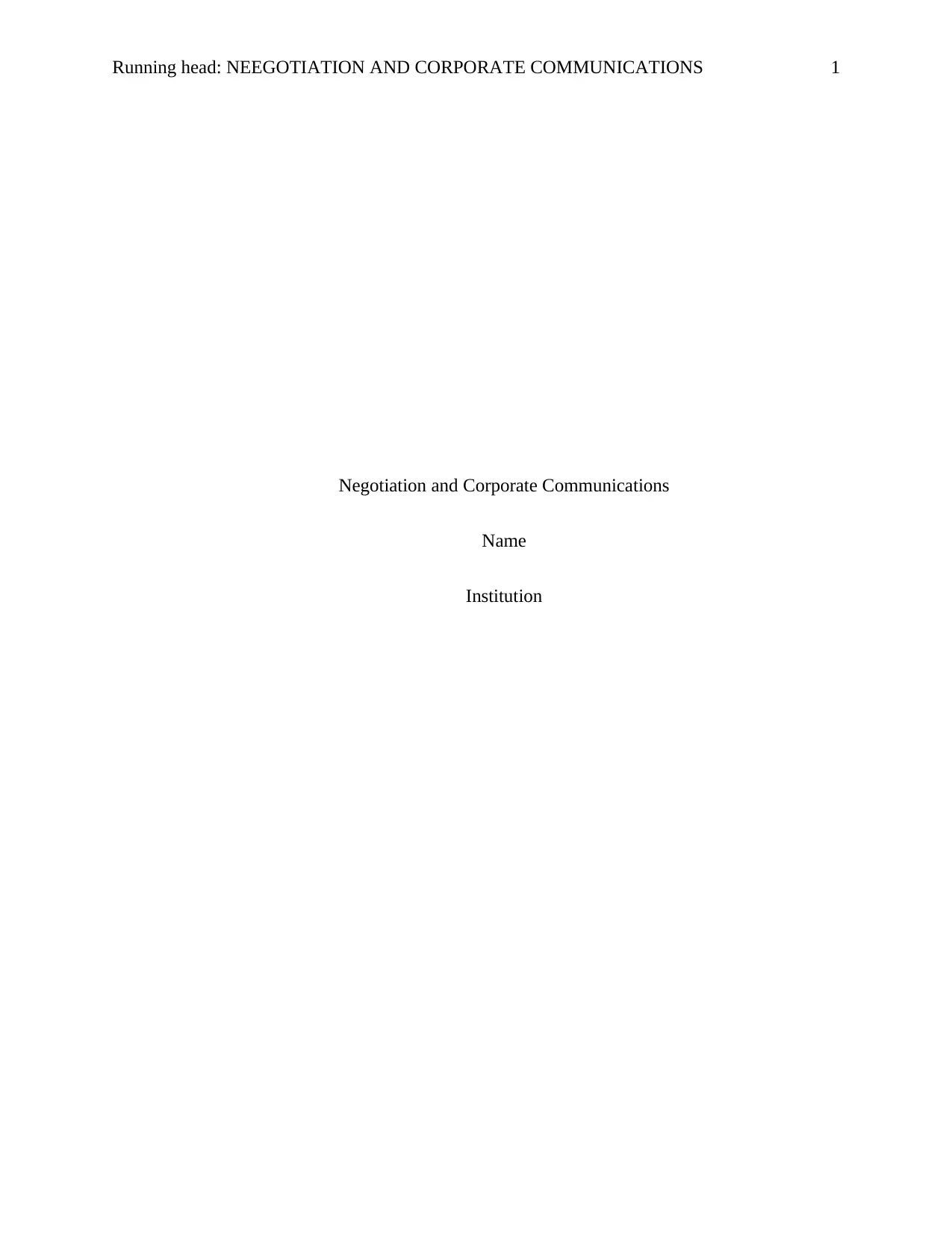
Running head: NEEGOTIATION AND CORPORATE COMMUNICATIONS 1
Negotiation and Corporate Communications
Name
Institution
Negotiation and Corporate Communications
Name
Institution
Paraphrase This Document
Need a fresh take? Get an instant paraphrase of this document with our AI Paraphraser
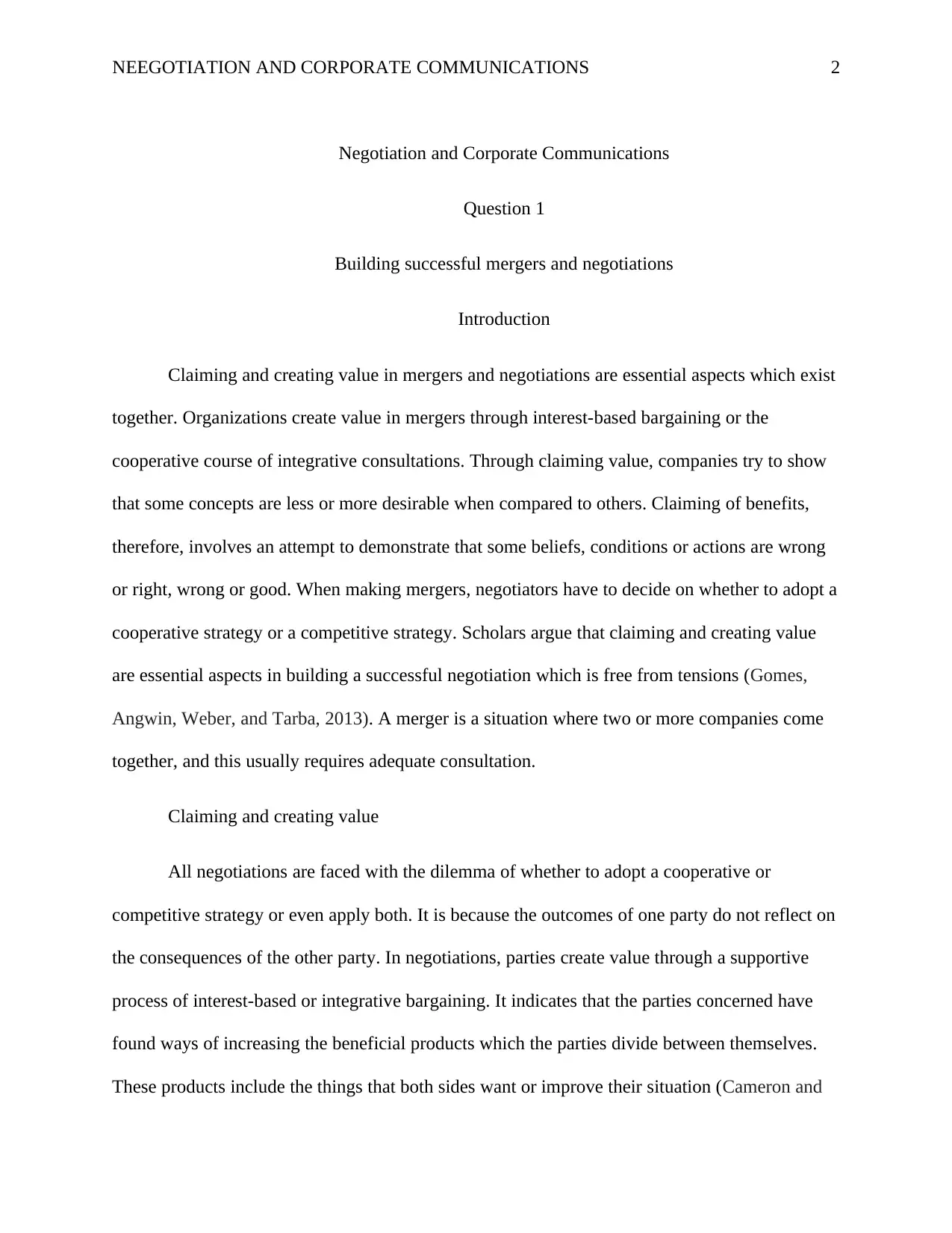
NEEGOTIATION AND CORPORATE COMMUNICATIONS 2
Negotiation and Corporate Communications
Question 1
Building successful mergers and negotiations
Introduction
Claiming and creating value in mergers and negotiations are essential aspects which exist
together. Organizations create value in mergers through interest-based bargaining or the
cooperative course of integrative consultations. Through claiming value, companies try to show
that some concepts are less or more desirable when compared to others. Claiming of benefits,
therefore, involves an attempt to demonstrate that some beliefs, conditions or actions are wrong
or right, wrong or good. When making mergers, negotiators have to decide on whether to adopt a
cooperative strategy or a competitive strategy. Scholars argue that claiming and creating value
are essential aspects in building a successful negotiation which is free from tensions (Gomes,
Angwin, Weber, and Tarba, 2013). A merger is a situation where two or more companies come
together, and this usually requires adequate consultation.
Claiming and creating value
All negotiations are faced with the dilemma of whether to adopt a cooperative or
competitive strategy or even apply both. It is because the outcomes of one party do not reflect on
the consequences of the other party. In negotiations, parties create value through a supportive
process of interest-based or integrative bargaining. It indicates that the parties concerned have
found ways of increasing the beneficial products which the parties divide between themselves.
These products include the things that both sides want or improve their situation (Cameron and
Negotiation and Corporate Communications
Question 1
Building successful mergers and negotiations
Introduction
Claiming and creating value in mergers and negotiations are essential aspects which exist
together. Organizations create value in mergers through interest-based bargaining or the
cooperative course of integrative consultations. Through claiming value, companies try to show
that some concepts are less or more desirable when compared to others. Claiming of benefits,
therefore, involves an attempt to demonstrate that some beliefs, conditions or actions are wrong
or right, wrong or good. When making mergers, negotiators have to decide on whether to adopt a
cooperative strategy or a competitive strategy. Scholars argue that claiming and creating value
are essential aspects in building a successful negotiation which is free from tensions (Gomes,
Angwin, Weber, and Tarba, 2013). A merger is a situation where two or more companies come
together, and this usually requires adequate consultation.
Claiming and creating value
All negotiations are faced with the dilemma of whether to adopt a cooperative or
competitive strategy or even apply both. It is because the outcomes of one party do not reflect on
the consequences of the other party. In negotiations, parties create value through a supportive
process of interest-based or integrative bargaining. It indicates that the parties concerned have
found ways of increasing the beneficial products which the parties divide between themselves.
These products include the things that both sides want or improve their situation (Cameron and
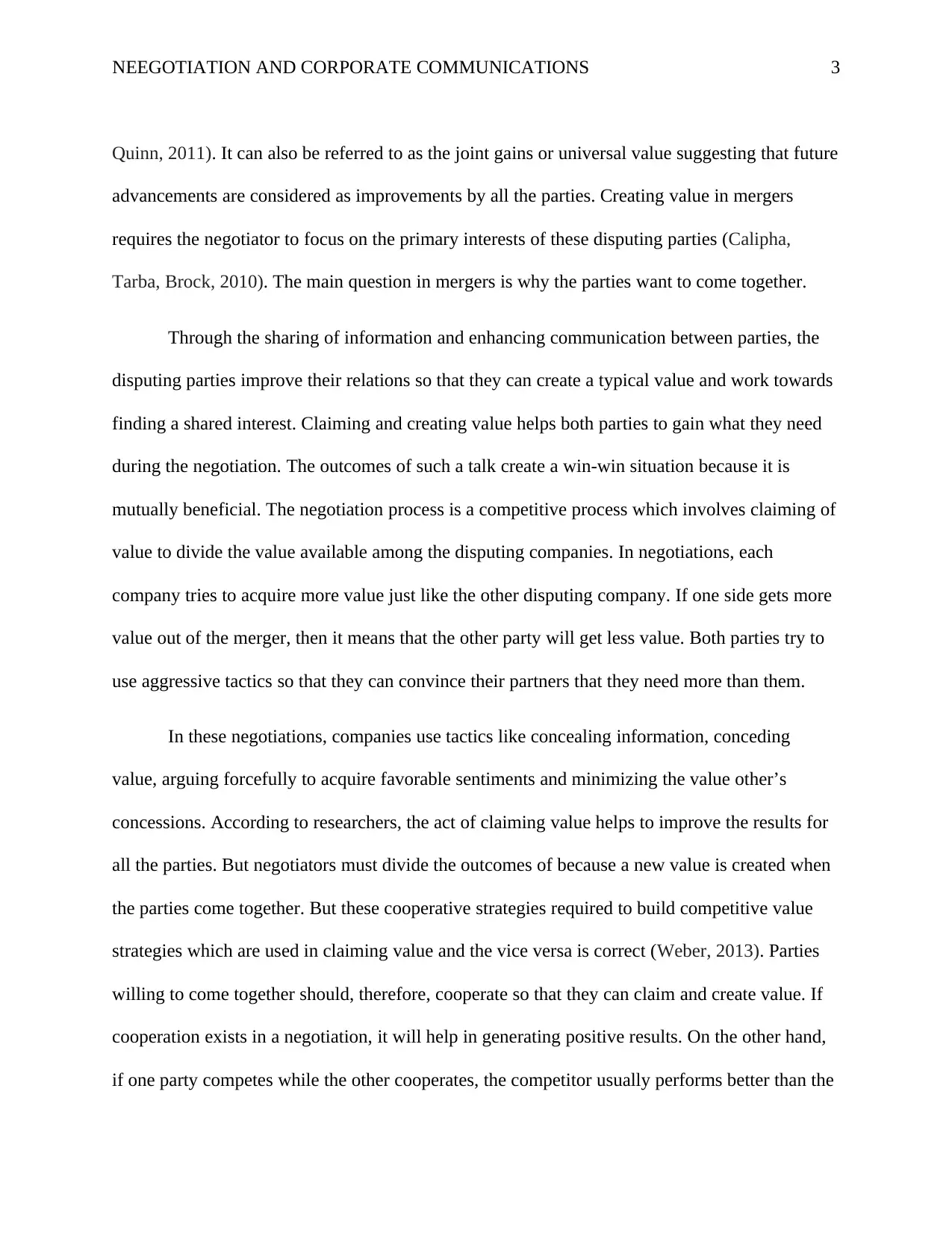
NEEGOTIATION AND CORPORATE COMMUNICATIONS 3
Quinn, 2011). It can also be referred to as the joint gains or universal value suggesting that future
advancements are considered as improvements by all the parties. Creating value in mergers
requires the negotiator to focus on the primary interests of these disputing parties (Calipha,
Tarba, Brock, 2010). The main question in mergers is why the parties want to come together.
Through the sharing of information and enhancing communication between parties, the
disputing parties improve their relations so that they can create a typical value and work towards
finding a shared interest. Claiming and creating value helps both parties to gain what they need
during the negotiation. The outcomes of such a talk create a win-win situation because it is
mutually beneficial. The negotiation process is a competitive process which involves claiming of
value to divide the value available among the disputing companies. In negotiations, each
company tries to acquire more value just like the other disputing company. If one side gets more
value out of the merger, then it means that the other party will get less value. Both parties try to
use aggressive tactics so that they can convince their partners that they need more than them.
In these negotiations, companies use tactics like concealing information, conceding
value, arguing forcefully to acquire favorable sentiments and minimizing the value other’s
concessions. According to researchers, the act of claiming value helps to improve the results for
all the parties. But negotiators must divide the outcomes of because a new value is created when
the parties come together. But these cooperative strategies required to build competitive value
strategies which are used in claiming value and the vice versa is correct (Weber, 2013). Parties
willing to come together should, therefore, cooperate so that they can claim and create value. If
cooperation exists in a negotiation, it will help in generating positive results. On the other hand,
if one party competes while the other cooperates, the competitor usually performs better than the
Quinn, 2011). It can also be referred to as the joint gains or universal value suggesting that future
advancements are considered as improvements by all the parties. Creating value in mergers
requires the negotiator to focus on the primary interests of these disputing parties (Calipha,
Tarba, Brock, 2010). The main question in mergers is why the parties want to come together.
Through the sharing of information and enhancing communication between parties, the
disputing parties improve their relations so that they can create a typical value and work towards
finding a shared interest. Claiming and creating value helps both parties to gain what they need
during the negotiation. The outcomes of such a talk create a win-win situation because it is
mutually beneficial. The negotiation process is a competitive process which involves claiming of
value to divide the value available among the disputing companies. In negotiations, each
company tries to acquire more value just like the other disputing company. If one side gets more
value out of the merger, then it means that the other party will get less value. Both parties try to
use aggressive tactics so that they can convince their partners that they need more than them.
In these negotiations, companies use tactics like concealing information, conceding
value, arguing forcefully to acquire favorable sentiments and minimizing the value other’s
concessions. According to researchers, the act of claiming value helps to improve the results for
all the parties. But negotiators must divide the outcomes of because a new value is created when
the parties come together. But these cooperative strategies required to build competitive value
strategies which are used in claiming value and the vice versa is correct (Weber, 2013). Parties
willing to come together should, therefore, cooperate so that they can claim and create value. If
cooperation exists in a negotiation, it will help in generating positive results. On the other hand,
if one party competes while the other cooperates, the competitor usually performs better than the
⊘ This is a preview!⊘
Do you want full access?
Subscribe today to unlock all pages.

Trusted by 1+ million students worldwide
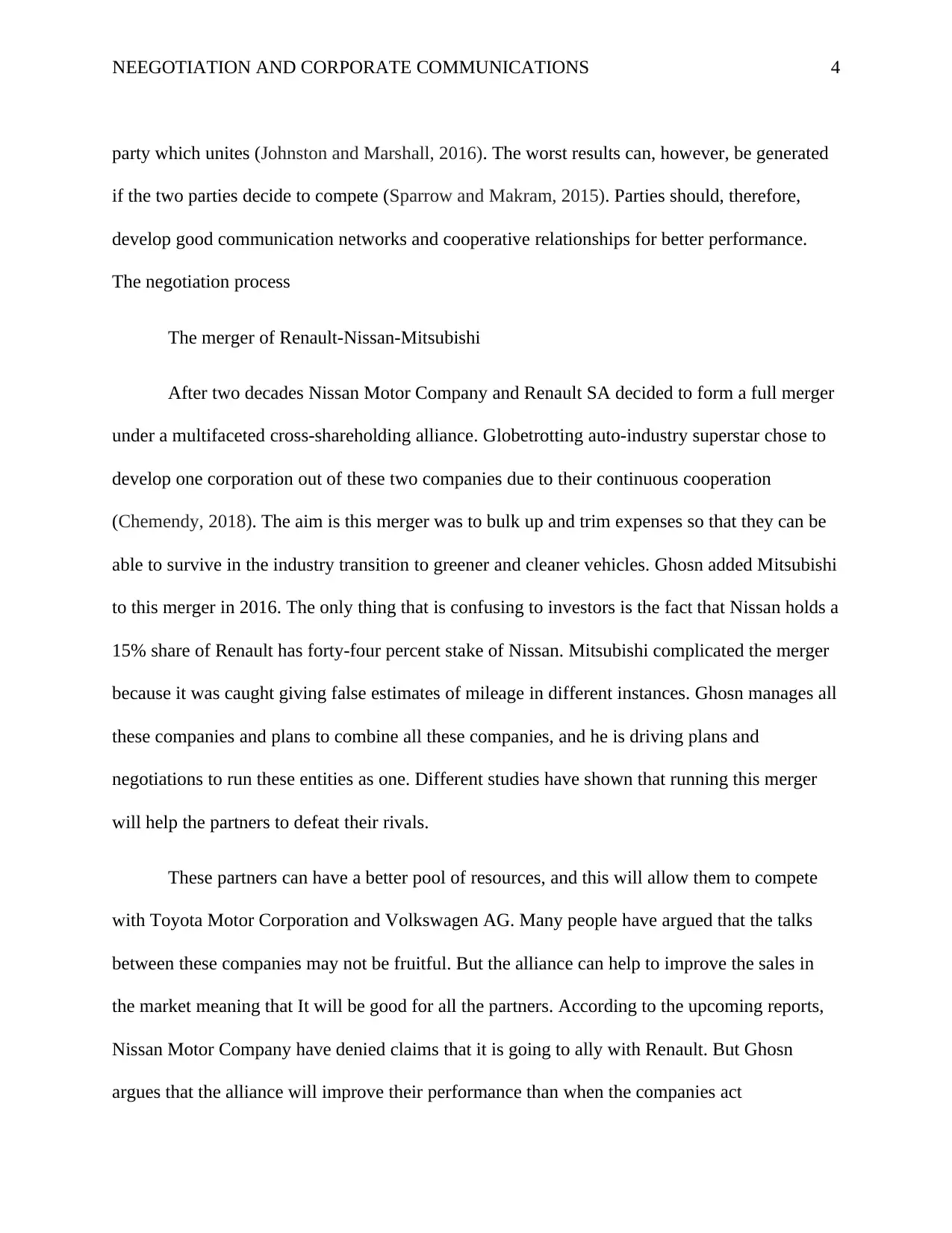
NEEGOTIATION AND CORPORATE COMMUNICATIONS 4
party which unites (Johnston and Marshall, 2016). The worst results can, however, be generated
if the two parties decide to compete (Sparrow and Makram, 2015). Parties should, therefore,
develop good communication networks and cooperative relationships for better performance.
The negotiation process
The merger of Renault-Nissan-Mitsubishi
After two decades Nissan Motor Company and Renault SA decided to form a full merger
under a multifaceted cross-shareholding alliance. Globetrotting auto-industry superstar chose to
develop one corporation out of these two companies due to their continuous cooperation
(Chemendy, 2018). The aim is this merger was to bulk up and trim expenses so that they can be
able to survive in the industry transition to greener and cleaner vehicles. Ghosn added Mitsubishi
to this merger in 2016. The only thing that is confusing to investors is the fact that Nissan holds a
15% share of Renault has forty-four percent stake of Nissan. Mitsubishi complicated the merger
because it was caught giving false estimates of mileage in different instances. Ghosn manages all
these companies and plans to combine all these companies, and he is driving plans and
negotiations to run these entities as one. Different studies have shown that running this merger
will help the partners to defeat their rivals.
These partners can have a better pool of resources, and this will allow them to compete
with Toyota Motor Corporation and Volkswagen AG. Many people have argued that the talks
between these companies may not be fruitful. But the alliance can help to improve the sales in
the market meaning that It will be good for all the partners. According to the upcoming reports,
Nissan Motor Company have denied claims that it is going to ally with Renault. But Ghosn
argues that the alliance will improve their performance than when the companies act
party which unites (Johnston and Marshall, 2016). The worst results can, however, be generated
if the two parties decide to compete (Sparrow and Makram, 2015). Parties should, therefore,
develop good communication networks and cooperative relationships for better performance.
The negotiation process
The merger of Renault-Nissan-Mitsubishi
After two decades Nissan Motor Company and Renault SA decided to form a full merger
under a multifaceted cross-shareholding alliance. Globetrotting auto-industry superstar chose to
develop one corporation out of these two companies due to their continuous cooperation
(Chemendy, 2018). The aim is this merger was to bulk up and trim expenses so that they can be
able to survive in the industry transition to greener and cleaner vehicles. Ghosn added Mitsubishi
to this merger in 2016. The only thing that is confusing to investors is the fact that Nissan holds a
15% share of Renault has forty-four percent stake of Nissan. Mitsubishi complicated the merger
because it was caught giving false estimates of mileage in different instances. Ghosn manages all
these companies and plans to combine all these companies, and he is driving plans and
negotiations to run these entities as one. Different studies have shown that running this merger
will help the partners to defeat their rivals.
These partners can have a better pool of resources, and this will allow them to compete
with Toyota Motor Corporation and Volkswagen AG. Many people have argued that the talks
between these companies may not be fruitful. But the alliance can help to improve the sales in
the market meaning that It will be good for all the partners. According to the upcoming reports,
Nissan Motor Company have denied claims that it is going to ally with Renault. But Ghosn
argues that the alliance will improve their performance than when the companies act
Paraphrase This Document
Need a fresh take? Get an instant paraphrase of this document with our AI Paraphraser
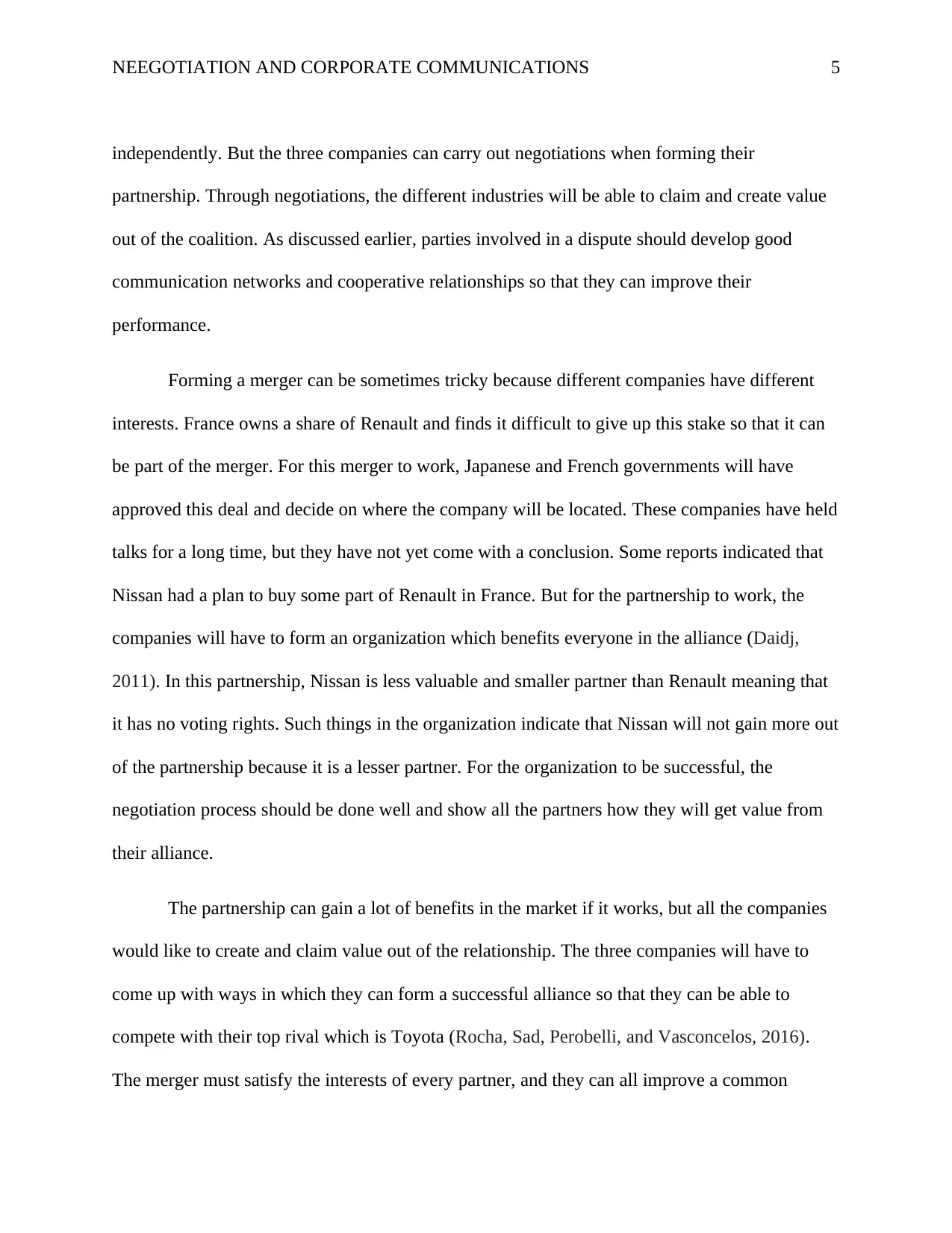
NEEGOTIATION AND CORPORATE COMMUNICATIONS 5
independently. But the three companies can carry out negotiations when forming their
partnership. Through negotiations, the different industries will be able to claim and create value
out of the coalition. As discussed earlier, parties involved in a dispute should develop good
communication networks and cooperative relationships so that they can improve their
performance.
Forming a merger can be sometimes tricky because different companies have different
interests. France owns a share of Renault and finds it difficult to give up this stake so that it can
be part of the merger. For this merger to work, Japanese and French governments will have
approved this deal and decide on where the company will be located. These companies have held
talks for a long time, but they have not yet come with a conclusion. Some reports indicated that
Nissan had a plan to buy some part of Renault in France. But for the partnership to work, the
companies will have to form an organization which benefits everyone in the alliance (Daidj,
2011). In this partnership, Nissan is less valuable and smaller partner than Renault meaning that
it has no voting rights. Such things in the organization indicate that Nissan will not gain more out
of the partnership because it is a lesser partner. For the organization to be successful, the
negotiation process should be done well and show all the partners how they will get value from
their alliance.
The partnership can gain a lot of benefits in the market if it works, but all the companies
would like to create and claim value out of the relationship. The three companies will have to
come up with ways in which they can form a successful alliance so that they can be able to
compete with their top rival which is Toyota (Rocha, Sad, Perobelli, and Vasconcelos, 2016).
The merger must satisfy the interests of every partner, and they can all improve a common
independently. But the three companies can carry out negotiations when forming their
partnership. Through negotiations, the different industries will be able to claim and create value
out of the coalition. As discussed earlier, parties involved in a dispute should develop good
communication networks and cooperative relationships so that they can improve their
performance.
Forming a merger can be sometimes tricky because different companies have different
interests. France owns a share of Renault and finds it difficult to give up this stake so that it can
be part of the merger. For this merger to work, Japanese and French governments will have
approved this deal and decide on where the company will be located. These companies have held
talks for a long time, but they have not yet come with a conclusion. Some reports indicated that
Nissan had a plan to buy some part of Renault in France. But for the partnership to work, the
companies will have to form an organization which benefits everyone in the alliance (Daidj,
2011). In this partnership, Nissan is less valuable and smaller partner than Renault meaning that
it has no voting rights. Such things in the organization indicate that Nissan will not gain more out
of the partnership because it is a lesser partner. For the organization to be successful, the
negotiation process should be done well and show all the partners how they will get value from
their alliance.
The partnership can gain a lot of benefits in the market if it works, but all the companies
would like to create and claim value out of the relationship. The three companies will have to
come up with ways in which they can form a successful alliance so that they can be able to
compete with their top rival which is Toyota (Rocha, Sad, Perobelli, and Vasconcelos, 2016).
The merger must satisfy the interests of every partner, and they can all improve a common
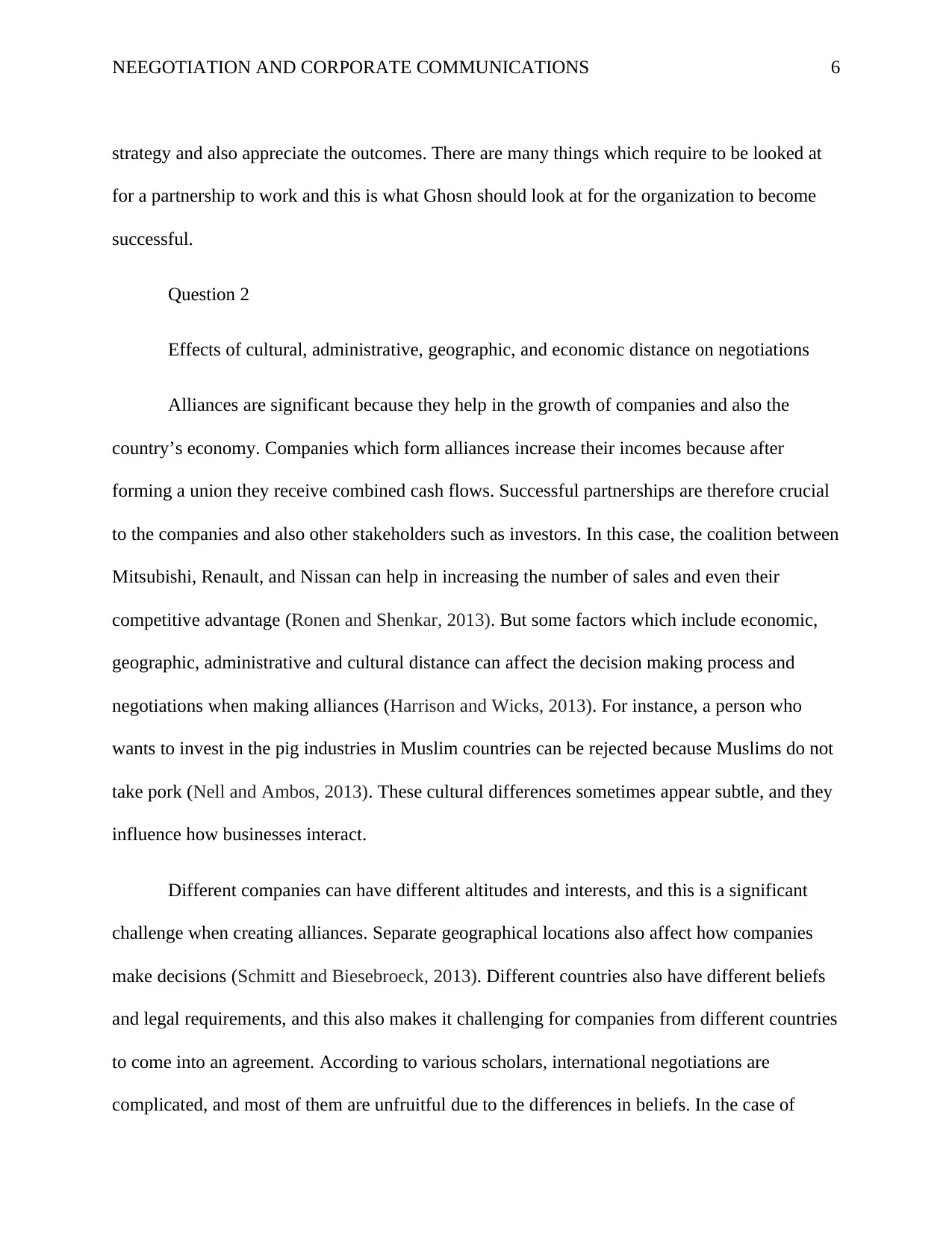
NEEGOTIATION AND CORPORATE COMMUNICATIONS 6
strategy and also appreciate the outcomes. There are many things which require to be looked at
for a partnership to work and this is what Ghosn should look at for the organization to become
successful.
Question 2
Effects of cultural, administrative, geographic, and economic distance on negotiations
Alliances are significant because they help in the growth of companies and also the
country’s economy. Companies which form alliances increase their incomes because after
forming a union they receive combined cash flows. Successful partnerships are therefore crucial
to the companies and also other stakeholders such as investors. In this case, the coalition between
Mitsubishi, Renault, and Nissan can help in increasing the number of sales and even their
competitive advantage (Ronen and Shenkar, 2013). But some factors which include economic,
geographic, administrative and cultural distance can affect the decision making process and
negotiations when making alliances (Harrison and Wicks, 2013). For instance, a person who
wants to invest in the pig industries in Muslim countries can be rejected because Muslims do not
take pork (Nell and Ambos, 2013). These cultural differences sometimes appear subtle, and they
influence how businesses interact.
Different companies can have different altitudes and interests, and this is a significant
challenge when creating alliances. Separate geographical locations also affect how companies
make decisions (Schmitt and Biesebroeck, 2013). Different countries also have different beliefs
and legal requirements, and this also makes it challenging for companies from different countries
to come into an agreement. According to various scholars, international negotiations are
complicated, and most of them are unfruitful due to the differences in beliefs. In the case of
strategy and also appreciate the outcomes. There are many things which require to be looked at
for a partnership to work and this is what Ghosn should look at for the organization to become
successful.
Question 2
Effects of cultural, administrative, geographic, and economic distance on negotiations
Alliances are significant because they help in the growth of companies and also the
country’s economy. Companies which form alliances increase their incomes because after
forming a union they receive combined cash flows. Successful partnerships are therefore crucial
to the companies and also other stakeholders such as investors. In this case, the coalition between
Mitsubishi, Renault, and Nissan can help in increasing the number of sales and even their
competitive advantage (Ronen and Shenkar, 2013). But some factors which include economic,
geographic, administrative and cultural distance can affect the decision making process and
negotiations when making alliances (Harrison and Wicks, 2013). For instance, a person who
wants to invest in the pig industries in Muslim countries can be rejected because Muslims do not
take pork (Nell and Ambos, 2013). These cultural differences sometimes appear subtle, and they
influence how businesses interact.
Different companies can have different altitudes and interests, and this is a significant
challenge when creating alliances. Separate geographical locations also affect how companies
make decisions (Schmitt and Biesebroeck, 2013). Different countries also have different beliefs
and legal requirements, and this also makes it challenging for companies from different countries
to come into an agreement. According to various scholars, international negotiations are
complicated, and most of them are unfruitful due to the differences in beliefs. In the case of
⊘ This is a preview!⊘
Do you want full access?
Subscribe today to unlock all pages.

Trusted by 1+ million students worldwide
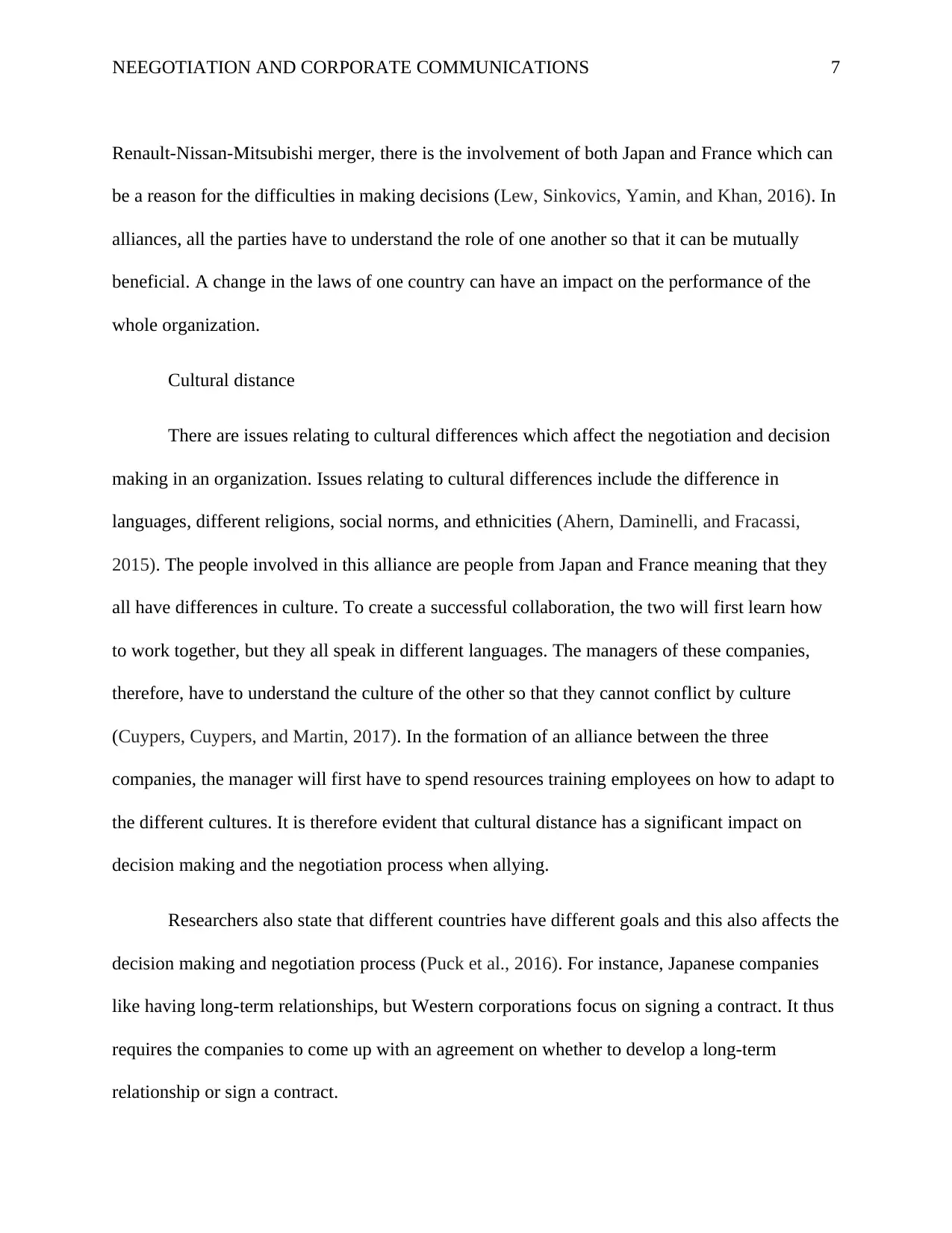
NEEGOTIATION AND CORPORATE COMMUNICATIONS 7
Renault-Nissan-Mitsubishi merger, there is the involvement of both Japan and France which can
be a reason for the difficulties in making decisions (Lew, Sinkovics, Yamin, and Khan, 2016). In
alliances, all the parties have to understand the role of one another so that it can be mutually
beneficial. A change in the laws of one country can have an impact on the performance of the
whole organization.
Cultural distance
There are issues relating to cultural differences which affect the negotiation and decision
making in an organization. Issues relating to cultural differences include the difference in
languages, different religions, social norms, and ethnicities (Ahern, Daminelli, and Fracassi,
2015). The people involved in this alliance are people from Japan and France meaning that they
all have differences in culture. To create a successful collaboration, the two will first learn how
to work together, but they all speak in different languages. The managers of these companies,
therefore, have to understand the culture of the other so that they cannot conflict by culture
(Cuypers, Cuypers, and Martin, 2017). In the formation of an alliance between the three
companies, the manager will first have to spend resources training employees on how to adapt to
the different cultures. It is therefore evident that cultural distance has a significant impact on
decision making and the negotiation process when allying.
Researchers also state that different countries have different goals and this also affects the
decision making and negotiation process (Puck et al., 2016). For instance, Japanese companies
like having long-term relationships, but Western corporations focus on signing a contract. It thus
requires the companies to come up with an agreement on whether to develop a long-term
relationship or sign a contract.
Renault-Nissan-Mitsubishi merger, there is the involvement of both Japan and France which can
be a reason for the difficulties in making decisions (Lew, Sinkovics, Yamin, and Khan, 2016). In
alliances, all the parties have to understand the role of one another so that it can be mutually
beneficial. A change in the laws of one country can have an impact on the performance of the
whole organization.
Cultural distance
There are issues relating to cultural differences which affect the negotiation and decision
making in an organization. Issues relating to cultural differences include the difference in
languages, different religions, social norms, and ethnicities (Ahern, Daminelli, and Fracassi,
2015). The people involved in this alliance are people from Japan and France meaning that they
all have differences in culture. To create a successful collaboration, the two will first learn how
to work together, but they all speak in different languages. The managers of these companies,
therefore, have to understand the culture of the other so that they cannot conflict by culture
(Cuypers, Cuypers, and Martin, 2017). In the formation of an alliance between the three
companies, the manager will first have to spend resources training employees on how to adapt to
the different cultures. It is therefore evident that cultural distance has a significant impact on
decision making and the negotiation process when allying.
Researchers also state that different countries have different goals and this also affects the
decision making and negotiation process (Puck et al., 2016). For instance, Japanese companies
like having long-term relationships, but Western corporations focus on signing a contract. It thus
requires the companies to come up with an agreement on whether to develop a long-term
relationship or sign a contract.
Paraphrase This Document
Need a fresh take? Get an instant paraphrase of this document with our AI Paraphraser
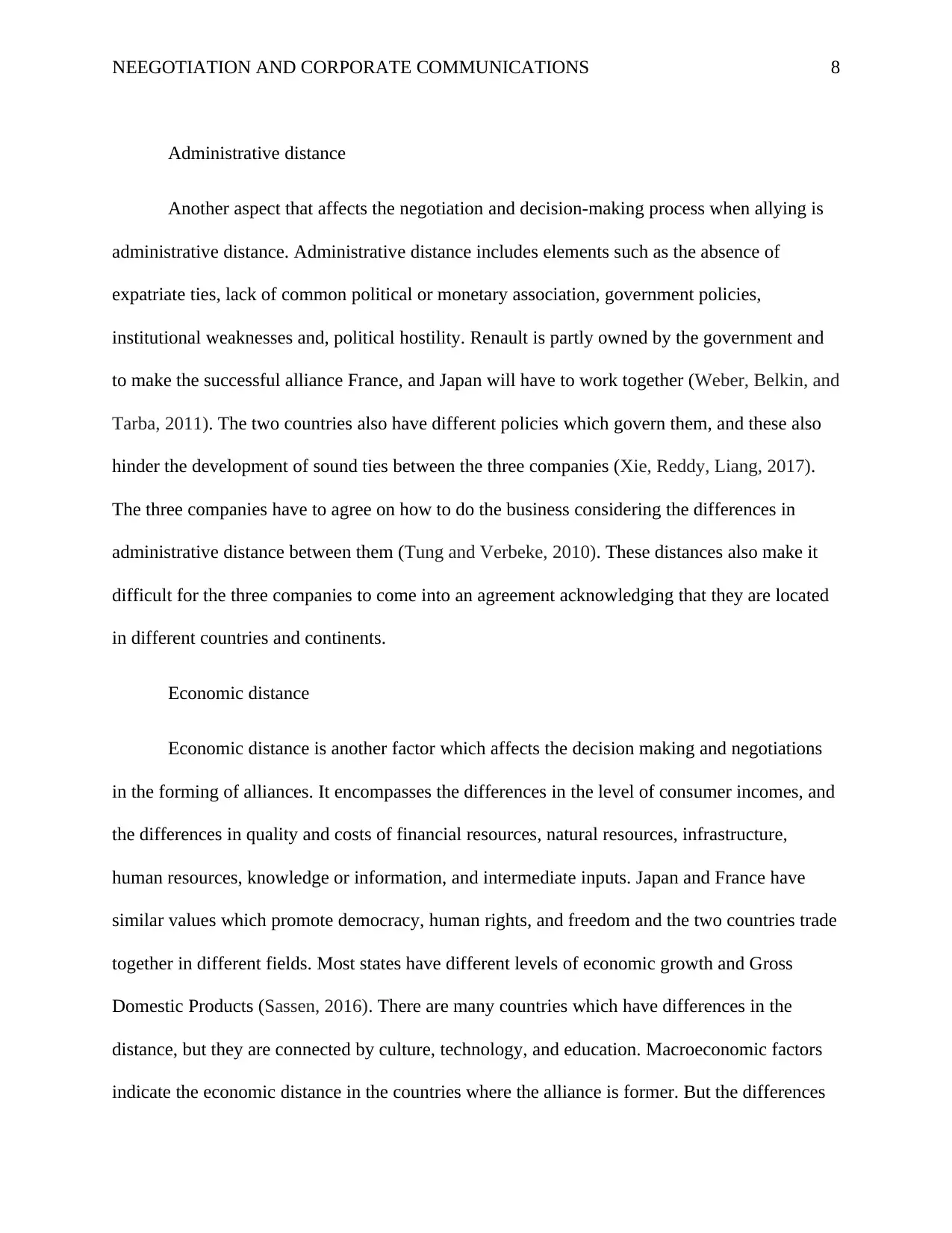
NEEGOTIATION AND CORPORATE COMMUNICATIONS 8
Administrative distance
Another aspect that affects the negotiation and decision-making process when allying is
administrative distance. Administrative distance includes elements such as the absence of
expatriate ties, lack of common political or monetary association, government policies,
institutional weaknesses and, political hostility. Renault is partly owned by the government and
to make the successful alliance France, and Japan will have to work together (Weber, Belkin, and
Tarba, 2011). The two countries also have different policies which govern them, and these also
hinder the development of sound ties between the three companies (Xie, Reddy, Liang, 2017).
The three companies have to agree on how to do the business considering the differences in
administrative distance between them (Tung and Verbeke, 2010). These distances also make it
difficult for the three companies to come into an agreement acknowledging that they are located
in different countries and continents.
Economic distance
Economic distance is another factor which affects the decision making and negotiations
in the forming of alliances. It encompasses the differences in the level of consumer incomes, and
the differences in quality and costs of financial resources, natural resources, infrastructure,
human resources, knowledge or information, and intermediate inputs. Japan and France have
similar values which promote democracy, human rights, and freedom and the two countries trade
together in different fields. Most states have different levels of economic growth and Gross
Domestic Products (Sassen, 2016). There are many countries which have differences in the
distance, but they are connected by culture, technology, and education. Macroeconomic factors
indicate the economic distance in the countries where the alliance is former. But the differences
Administrative distance
Another aspect that affects the negotiation and decision-making process when allying is
administrative distance. Administrative distance includes elements such as the absence of
expatriate ties, lack of common political or monetary association, government policies,
institutional weaknesses and, political hostility. Renault is partly owned by the government and
to make the successful alliance France, and Japan will have to work together (Weber, Belkin, and
Tarba, 2011). The two countries also have different policies which govern them, and these also
hinder the development of sound ties between the three companies (Xie, Reddy, Liang, 2017).
The three companies have to agree on how to do the business considering the differences in
administrative distance between them (Tung and Verbeke, 2010). These distances also make it
difficult for the three companies to come into an agreement acknowledging that they are located
in different countries and continents.
Economic distance
Economic distance is another factor which affects the decision making and negotiations
in the forming of alliances. It encompasses the differences in the level of consumer incomes, and
the differences in quality and costs of financial resources, natural resources, infrastructure,
human resources, knowledge or information, and intermediate inputs. Japan and France have
similar values which promote democracy, human rights, and freedom and the two countries trade
together in different fields. Most states have different levels of economic growth and Gross
Domestic Products (Sassen, 2016). There are many countries which have differences in the
distance, but they are connected by culture, technology, and education. Macroeconomic factors
indicate the economic distance in the countries where the alliance is former. But the differences
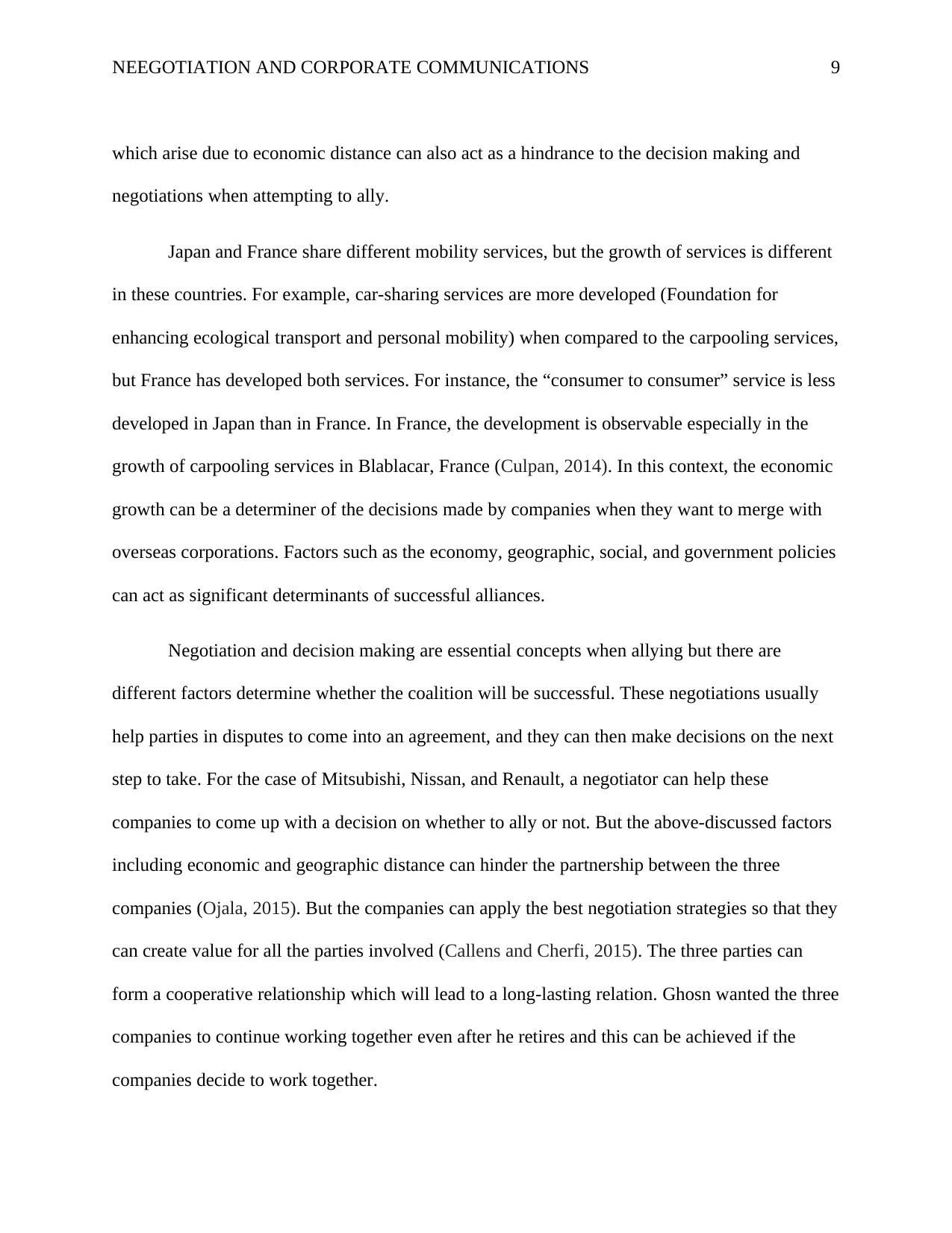
NEEGOTIATION AND CORPORATE COMMUNICATIONS 9
which arise due to economic distance can also act as a hindrance to the decision making and
negotiations when attempting to ally.
Japan and France share different mobility services, but the growth of services is different
in these countries. For example, car-sharing services are more developed (Foundation for
enhancing ecological transport and personal mobility) when compared to the carpooling services,
but France has developed both services. For instance, the “consumer to consumer” service is less
developed in Japan than in France. In France, the development is observable especially in the
growth of carpooling services in Blablacar, France (Culpan, 2014). In this context, the economic
growth can be a determiner of the decisions made by companies when they want to merge with
overseas corporations. Factors such as the economy, geographic, social, and government policies
can act as significant determinants of successful alliances.
Negotiation and decision making are essential concepts when allying but there are
different factors determine whether the coalition will be successful. These negotiations usually
help parties in disputes to come into an agreement, and they can then make decisions on the next
step to take. For the case of Mitsubishi, Nissan, and Renault, a negotiator can help these
companies to come up with a decision on whether to ally or not. But the above-discussed factors
including economic and geographic distance can hinder the partnership between the three
companies (Ojala, 2015). But the companies can apply the best negotiation strategies so that they
can create value for all the parties involved (Callens and Cherfi, 2015). The three parties can
form a cooperative relationship which will lead to a long-lasting relation. Ghosn wanted the three
companies to continue working together even after he retires and this can be achieved if the
companies decide to work together.
which arise due to economic distance can also act as a hindrance to the decision making and
negotiations when attempting to ally.
Japan and France share different mobility services, but the growth of services is different
in these countries. For example, car-sharing services are more developed (Foundation for
enhancing ecological transport and personal mobility) when compared to the carpooling services,
but France has developed both services. For instance, the “consumer to consumer” service is less
developed in Japan than in France. In France, the development is observable especially in the
growth of carpooling services in Blablacar, France (Culpan, 2014). In this context, the economic
growth can be a determiner of the decisions made by companies when they want to merge with
overseas corporations. Factors such as the economy, geographic, social, and government policies
can act as significant determinants of successful alliances.
Negotiation and decision making are essential concepts when allying but there are
different factors determine whether the coalition will be successful. These negotiations usually
help parties in disputes to come into an agreement, and they can then make decisions on the next
step to take. For the case of Mitsubishi, Nissan, and Renault, a negotiator can help these
companies to come up with a decision on whether to ally or not. But the above-discussed factors
including economic and geographic distance can hinder the partnership between the three
companies (Ojala, 2015). But the companies can apply the best negotiation strategies so that they
can create value for all the parties involved (Callens and Cherfi, 2015). The three parties can
form a cooperative relationship which will lead to a long-lasting relation. Ghosn wanted the three
companies to continue working together even after he retires and this can be achieved if the
companies decide to work together.
⊘ This is a preview!⊘
Do you want full access?
Subscribe today to unlock all pages.

Trusted by 1+ million students worldwide
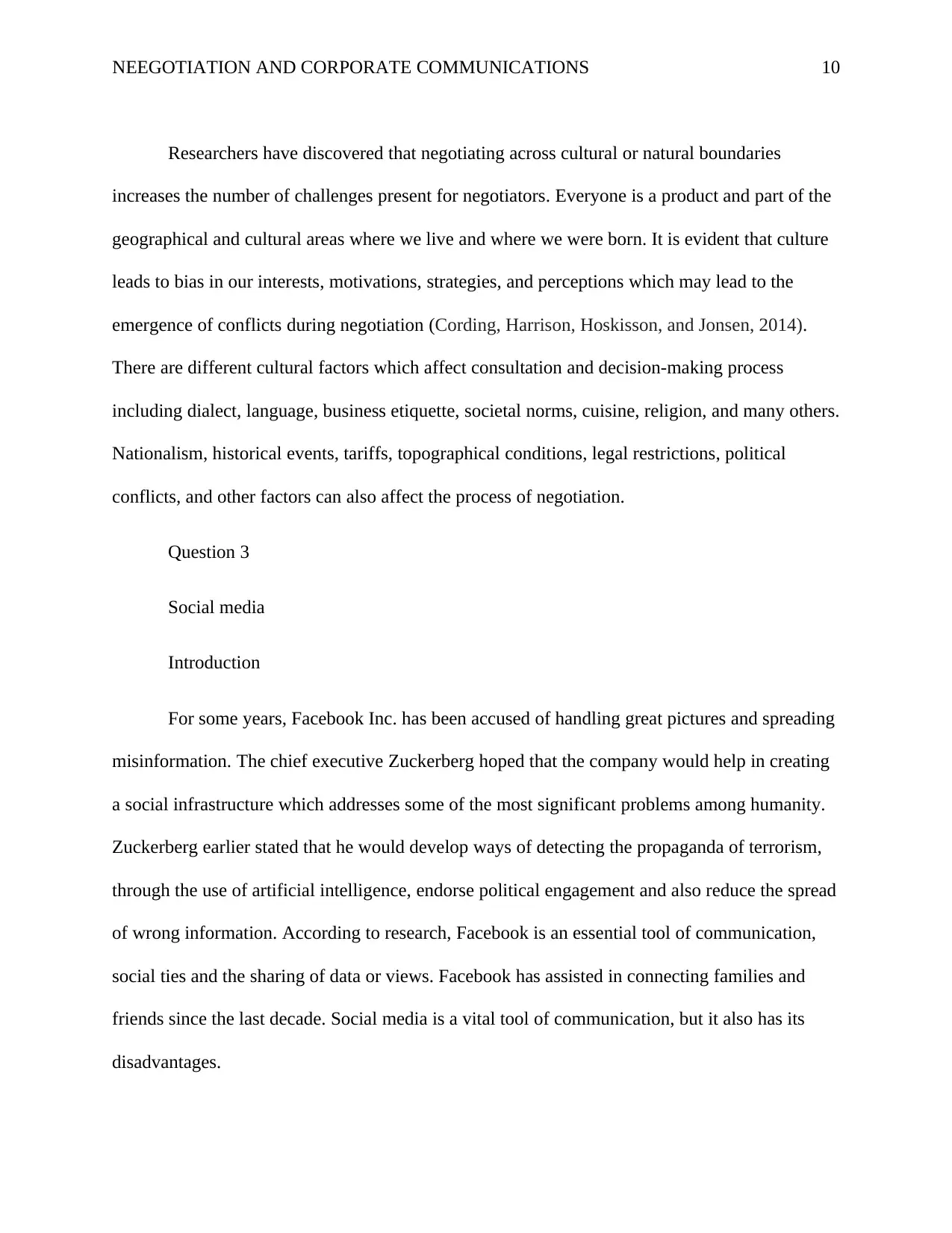
NEEGOTIATION AND CORPORATE COMMUNICATIONS 10
Researchers have discovered that negotiating across cultural or natural boundaries
increases the number of challenges present for negotiators. Everyone is a product and part of the
geographical and cultural areas where we live and where we were born. It is evident that culture
leads to bias in our interests, motivations, strategies, and perceptions which may lead to the
emergence of conflicts during negotiation (Cording, Harrison, Hoskisson, and Jonsen, 2014).
There are different cultural factors which affect consultation and decision-making process
including dialect, language, business etiquette, societal norms, cuisine, religion, and many others.
Nationalism, historical events, tariffs, topographical conditions, legal restrictions, political
conflicts, and other factors can also affect the process of negotiation.
Question 3
Social media
Introduction
For some years, Facebook Inc. has been accused of handling great pictures and spreading
misinformation. The chief executive Zuckerberg hoped that the company would help in creating
a social infrastructure which addresses some of the most significant problems among humanity.
Zuckerberg earlier stated that he would develop ways of detecting the propaganda of terrorism,
through the use of artificial intelligence, endorse political engagement and also reduce the spread
of wrong information. According to research, Facebook is an essential tool of communication,
social ties and the sharing of data or views. Facebook has assisted in connecting families and
friends since the last decade. Social media is a vital tool of communication, but it also has its
disadvantages.
Researchers have discovered that negotiating across cultural or natural boundaries
increases the number of challenges present for negotiators. Everyone is a product and part of the
geographical and cultural areas where we live and where we were born. It is evident that culture
leads to bias in our interests, motivations, strategies, and perceptions which may lead to the
emergence of conflicts during negotiation (Cording, Harrison, Hoskisson, and Jonsen, 2014).
There are different cultural factors which affect consultation and decision-making process
including dialect, language, business etiquette, societal norms, cuisine, religion, and many others.
Nationalism, historical events, tariffs, topographical conditions, legal restrictions, political
conflicts, and other factors can also affect the process of negotiation.
Question 3
Social media
Introduction
For some years, Facebook Inc. has been accused of handling great pictures and spreading
misinformation. The chief executive Zuckerberg hoped that the company would help in creating
a social infrastructure which addresses some of the most significant problems among humanity.
Zuckerberg earlier stated that he would develop ways of detecting the propaganda of terrorism,
through the use of artificial intelligence, endorse political engagement and also reduce the spread
of wrong information. According to research, Facebook is an essential tool of communication,
social ties and the sharing of data or views. Facebook has assisted in connecting families and
friends since the last decade. Social media is a vital tool of communication, but it also has its
disadvantages.
Paraphrase This Document
Need a fresh take? Get an instant paraphrase of this document with our AI Paraphraser
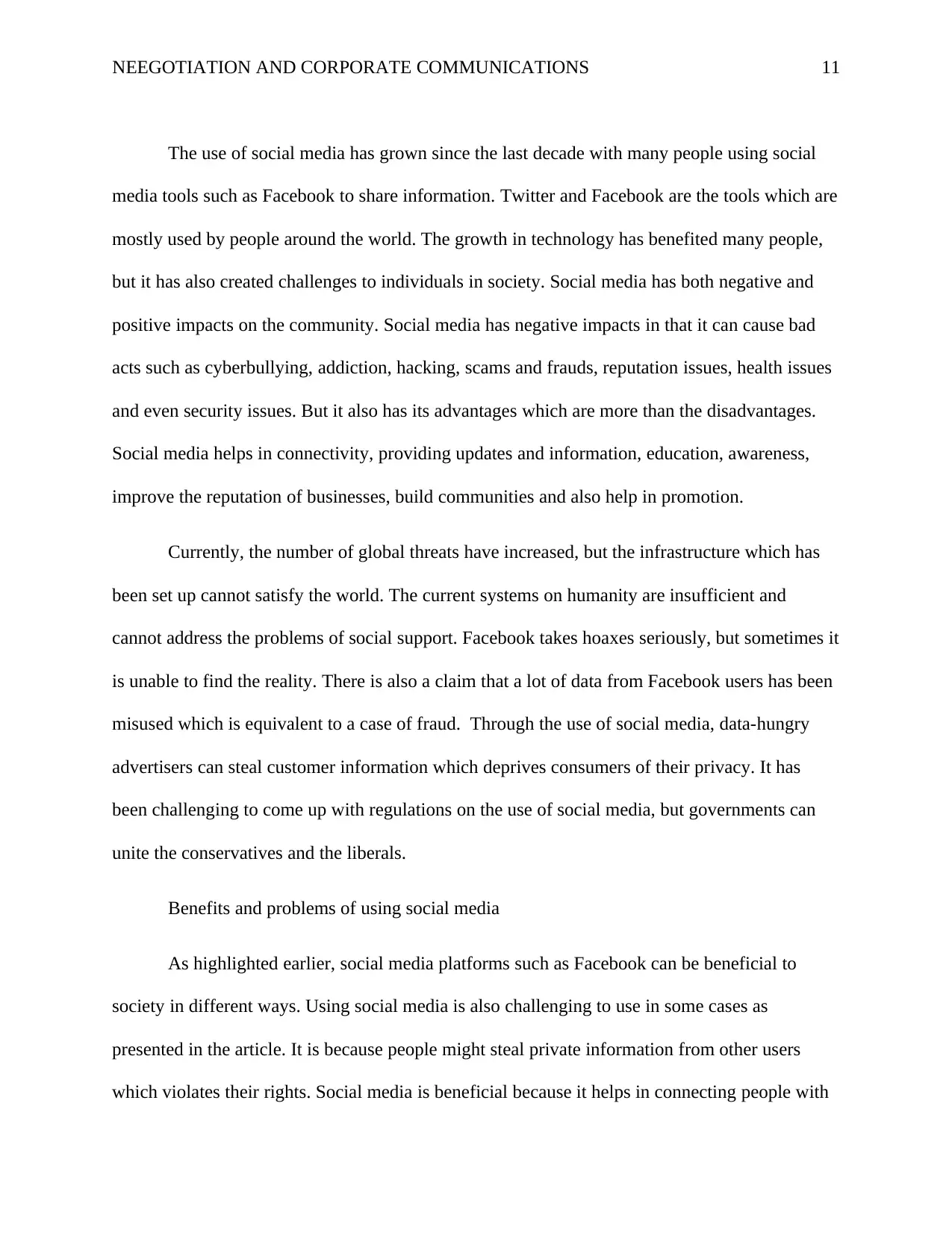
NEEGOTIATION AND CORPORATE COMMUNICATIONS 11
The use of social media has grown since the last decade with many people using social
media tools such as Facebook to share information. Twitter and Facebook are the tools which are
mostly used by people around the world. The growth in technology has benefited many people,
but it has also created challenges to individuals in society. Social media has both negative and
positive impacts on the community. Social media has negative impacts in that it can cause bad
acts such as cyberbullying, addiction, hacking, scams and frauds, reputation issues, health issues
and even security issues. But it also has its advantages which are more than the disadvantages.
Social media helps in connectivity, providing updates and information, education, awareness,
improve the reputation of businesses, build communities and also help in promotion.
Currently, the number of global threats have increased, but the infrastructure which has
been set up cannot satisfy the world. The current systems on humanity are insufficient and
cannot address the problems of social support. Facebook takes hoaxes seriously, but sometimes it
is unable to find the reality. There is also a claim that a lot of data from Facebook users has been
misused which is equivalent to a case of fraud. Through the use of social media, data-hungry
advertisers can steal customer information which deprives consumers of their privacy. It has
been challenging to come up with regulations on the use of social media, but governments can
unite the conservatives and the liberals.
Benefits and problems of using social media
As highlighted earlier, social media platforms such as Facebook can be beneficial to
society in different ways. Using social media is also challenging to use in some cases as
presented in the article. It is because people might steal private information from other users
which violates their rights. Social media is beneficial because it helps in connecting people with
The use of social media has grown since the last decade with many people using social
media tools such as Facebook to share information. Twitter and Facebook are the tools which are
mostly used by people around the world. The growth in technology has benefited many people,
but it has also created challenges to individuals in society. Social media has both negative and
positive impacts on the community. Social media has negative impacts in that it can cause bad
acts such as cyberbullying, addiction, hacking, scams and frauds, reputation issues, health issues
and even security issues. But it also has its advantages which are more than the disadvantages.
Social media helps in connectivity, providing updates and information, education, awareness,
improve the reputation of businesses, build communities and also help in promotion.
Currently, the number of global threats have increased, but the infrastructure which has
been set up cannot satisfy the world. The current systems on humanity are insufficient and
cannot address the problems of social support. Facebook takes hoaxes seriously, but sometimes it
is unable to find the reality. There is also a claim that a lot of data from Facebook users has been
misused which is equivalent to a case of fraud. Through the use of social media, data-hungry
advertisers can steal customer information which deprives consumers of their privacy. It has
been challenging to come up with regulations on the use of social media, but governments can
unite the conservatives and the liberals.
Benefits and problems of using social media
As highlighted earlier, social media platforms such as Facebook can be beneficial to
society in different ways. Using social media is also challenging to use in some cases as
presented in the article. It is because people might steal private information from other users
which violates their rights. Social media is beneficial because it helps in connecting people with
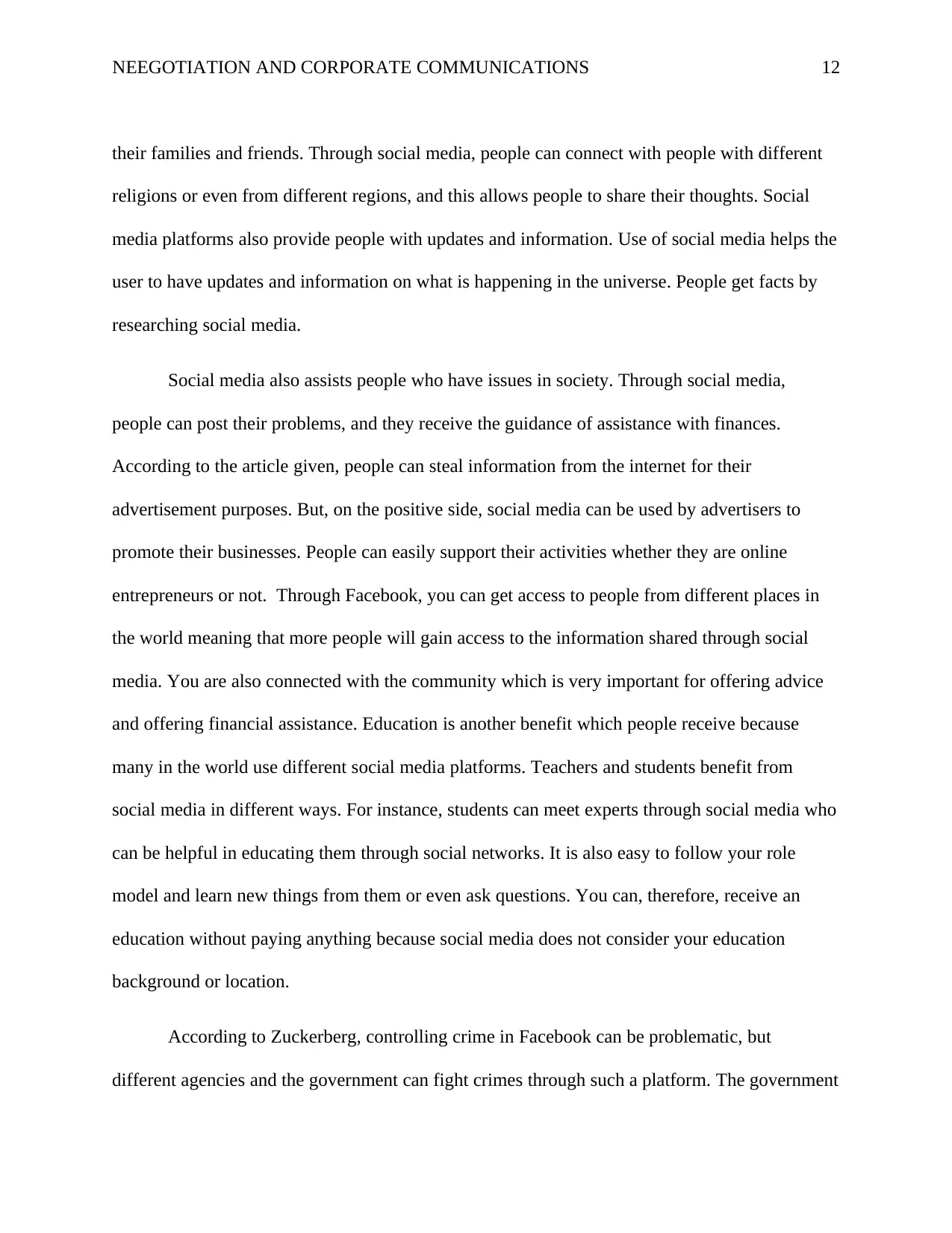
NEEGOTIATION AND CORPORATE COMMUNICATIONS 12
their families and friends. Through social media, people can connect with people with different
religions or even from different regions, and this allows people to share their thoughts. Social
media platforms also provide people with updates and information. Use of social media helps the
user to have updates and information on what is happening in the universe. People get facts by
researching social media.
Social media also assists people who have issues in society. Through social media,
people can post their problems, and they receive the guidance of assistance with finances.
According to the article given, people can steal information from the internet for their
advertisement purposes. But, on the positive side, social media can be used by advertisers to
promote their businesses. People can easily support their activities whether they are online
entrepreneurs or not. Through Facebook, you can get access to people from different places in
the world meaning that more people will gain access to the information shared through social
media. You are also connected with the community which is very important for offering advice
and offering financial assistance. Education is another benefit which people receive because
many in the world use different social media platforms. Teachers and students benefit from
social media in different ways. For instance, students can meet experts through social media who
can be helpful in educating them through social networks. It is also easy to follow your role
model and learn new things from them or even ask questions. You can, therefore, receive an
education without paying anything because social media does not consider your education
background or location.
According to Zuckerberg, controlling crime in Facebook can be problematic, but
different agencies and the government can fight crimes through such a platform. The government
their families and friends. Through social media, people can connect with people with different
religions or even from different regions, and this allows people to share their thoughts. Social
media platforms also provide people with updates and information. Use of social media helps the
user to have updates and information on what is happening in the universe. People get facts by
researching social media.
Social media also assists people who have issues in society. Through social media,
people can post their problems, and they receive the guidance of assistance with finances.
According to the article given, people can steal information from the internet for their
advertisement purposes. But, on the positive side, social media can be used by advertisers to
promote their businesses. People can easily support their activities whether they are online
entrepreneurs or not. Through Facebook, you can get access to people from different places in
the world meaning that more people will gain access to the information shared through social
media. You are also connected with the community which is very important for offering advice
and offering financial assistance. Education is another benefit which people receive because
many in the world use different social media platforms. Teachers and students benefit from
social media in different ways. For instance, students can meet experts through social media who
can be helpful in educating them through social networks. It is also easy to follow your role
model and learn new things from them or even ask questions. You can, therefore, receive an
education without paying anything because social media does not consider your education
background or location.
According to Zuckerberg, controlling crime in Facebook can be problematic, but
different agencies and the government can fight crimes through such a platform. The government
⊘ This is a preview!⊘
Do you want full access?
Subscribe today to unlock all pages.

Trusted by 1+ million students worldwide
1 out of 24
Related Documents
Your All-in-One AI-Powered Toolkit for Academic Success.
+13062052269
info@desklib.com
Available 24*7 on WhatsApp / Email
![[object Object]](/_next/static/media/star-bottom.7253800d.svg)
Unlock your academic potential
Copyright © 2020–2026 A2Z Services. All Rights Reserved. Developed and managed by ZUCOL.





